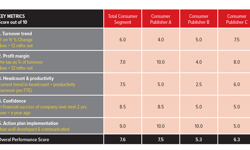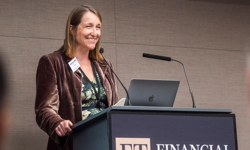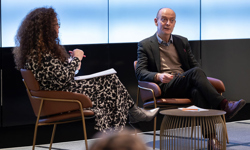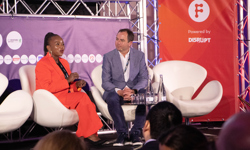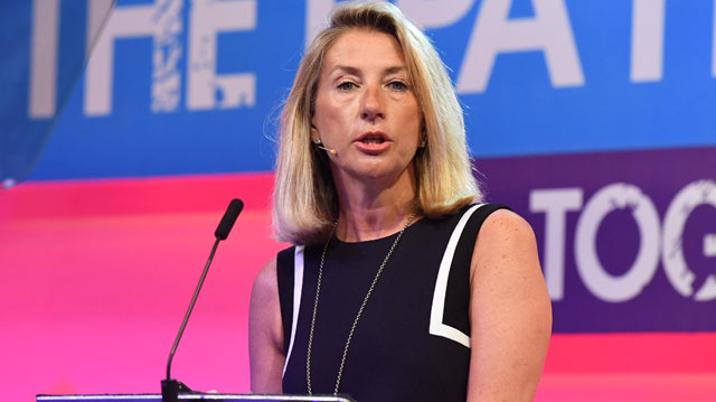
Andria Vidler quoted former US president, Barack Obama: “Change will not come if we wait for some other person, or if we wait for some other time. We are the ones we’ve been waiting for. We are the change that we seek.”
Publishers too, she said, need to be the change makers. Industries come and most of them go, but those that stay are the ones that adapt themselves to evolving markets.
Tobacco Dock, the venue for the festival, was itself held up as an example of successful evolution. Built in 1811 to store and distribute imported tobacco, it had since reinvented itself as a popular conference and events venue.
Less successful at reading the tobacco leaves were companies like Kodak and Blackberry, two corporate giants that simply did not “disrupt themselves fast enough”. Technology changes quicker than organisations and it’s all too easy to lose relevance, she warned.
As an industry, we have to recognise the changes and proactively reinvent ourselves; we can’t sit back and wait for solutions to present themselves or for our previous customers to return to their old habits, because that won’t happen.
The publishing industry is going through a period of deep, fundamental and permanent change. “Content consumption has changed forever. Copy sales are diminishing and advertisers are looking for new routes to market. Magazines are closing and minor brands being consolidated into major ones. It’s a painful process.”
On a positive note, said Andria, there were lots of examples of publishing success stories, which we as an industry should be shouting about; examples of publishers showing entrepreneurial strength, of grabbing opportunities by the scruff of the neck and of, effectively, redefining what it means to be a media company. The cross-platform presence of many magazine brands is a dynamic one. Andria singled out Future Publishing, Health Service Journal (which had gone from being a “mag with jobs” to a digital intelligence service), Condé Nast for its College of Fashion, Wired for its events and consultancy and What Car? for becoming an invaluable aid to consumers looking to buy a car.
These publishers had reappraised their audiences and realised that they wanted a different value proposition, and, crucially, they have made bold changes.
Our silver bullet
As an industry, she continued, we have indisputable strengths. We know what content is relevant and essential. Content is king and is our silver bullet. Our task is twofold: focus on content and continue to innovate.
Format is secondary: “I don’t care if the title is print or digital as long as it stays true to its ethos. We must stay close to our readers, whatever the format.”
As for Centaur: “We are a completely new business. We have transitioned from being a traditional publisher to a content and insight-led information group, with community intelligence and connections at its core.”
Her change mission focused on: making the business a much simpler one, breaking down silos (apparently the Marketing Week team never used to talk to the MW Live team … they do now); getting the company to see itself as a provider of business information in many formats; offsetting the decline in advertising and sponsorship with recurring revenue models; turning passive audiences into customers.
A customer-centric approach was key. In today’s world, Centaur realised that its customers wanted more in-depth market analysis coupled with actionable intelligence, data and advice. And these customers benefit from multi-media, market-focused teams, backed up by agile and expert central support teams.
“We are,” she said, “focused on helping businesses win.”
She singled out two Centaur titles for special mention: The Lawyer and Marketing Week.
In 2013, The Lawyer was a weekly trade magazine which made 70% of its revenue from classifieds and sponsorship. There was no audience revenue. With traditional revenues under pressure and declining, they devised a plan of gradual reinvention, involving a perpetual process of ‘pilot & test’, as they sought to take the audience and advertisers on an evolutionary journey. Fast forward to the present, and the title is now positioned as a ‘digital intelligence service’; it has 200 corporate accounts; revenue has grown 15% over the past four years, replacing the lost revenues and adding more. The print magazine is now a successful monthly and digital revenues are growing fast.
As for the 40-year-old Marketing Week, it too is now a monthly magazine. The brand now features two “must-attend” annual events in the Festival of Marketing and Marketing Week Live, has launched a successful e-learning business and developed new content offerings and revenue streams, whilst “absolutely staying true to its heritage”. Marketing Week also now offers top level marketing consultancy services, “helping their clients win”. And the old silos have been broken down.”
As you might have noted, ‘winning’ is a recurring theme.
“It’s a very exciting place to be”, said Andria of her company. Now, she would say that wouldn’t she, but it all sounded pretty compelling to me.
The key questions
So how can the rest of us be a bit more like Centaur? Andria advised everyone to ask themselves five key questions:
1. How brave is our business strategy?
2. Are we really innovating? As opposed to tweaking around the edges.
3. Are we really customer focused? The closer you are to the customer, the better.
4. Are we learning from others?
5. How good are our communications? Communications and leadership are better the more straightforward the communications and messaging. Keep it simple.
For business leaders, bringing your team and company with you is fundamental to business success. Quoting Henry Ford, she said: “If everyone is moving forward together, then success takes care of itself.”
If your answers to the five questions were ‘very’, ‘yes’, ‘yes’, ‘yes’ and ‘very’, then you’re most likely already a very successful publishing company. Congratulations. If your answers fell short anywhere, then there’s work still to be done, but the good news is that you know it and you’re doing something about it.
The industry has much to celebrate and shout about. We should be making more noise. Collectively, we need to get our mojo back, said the Centaur Media CEO.




